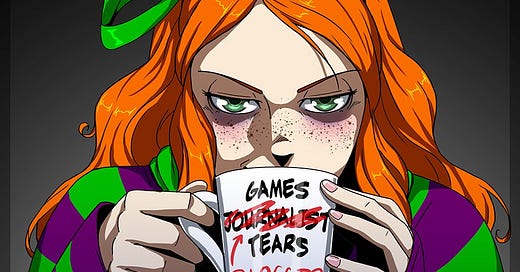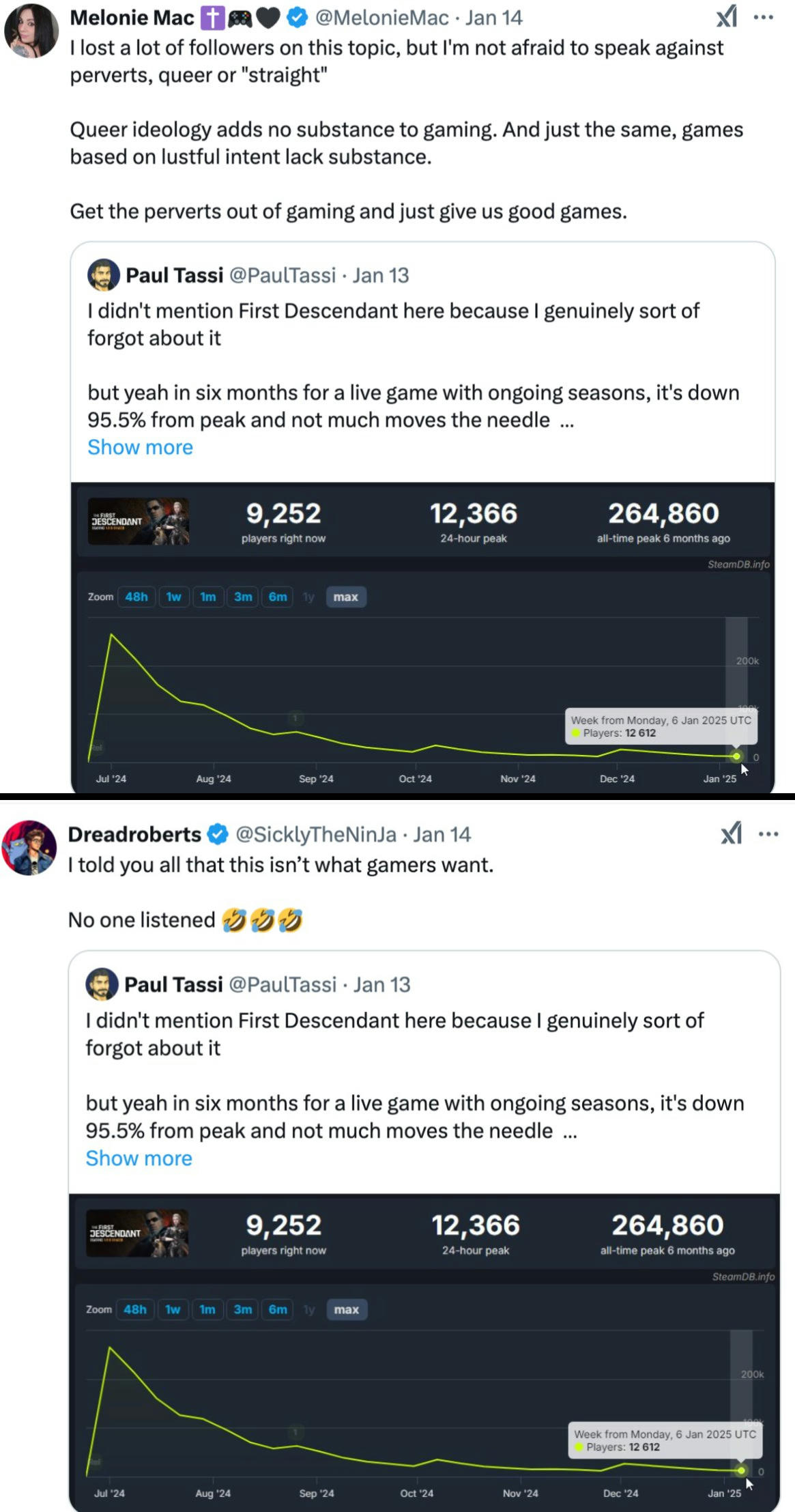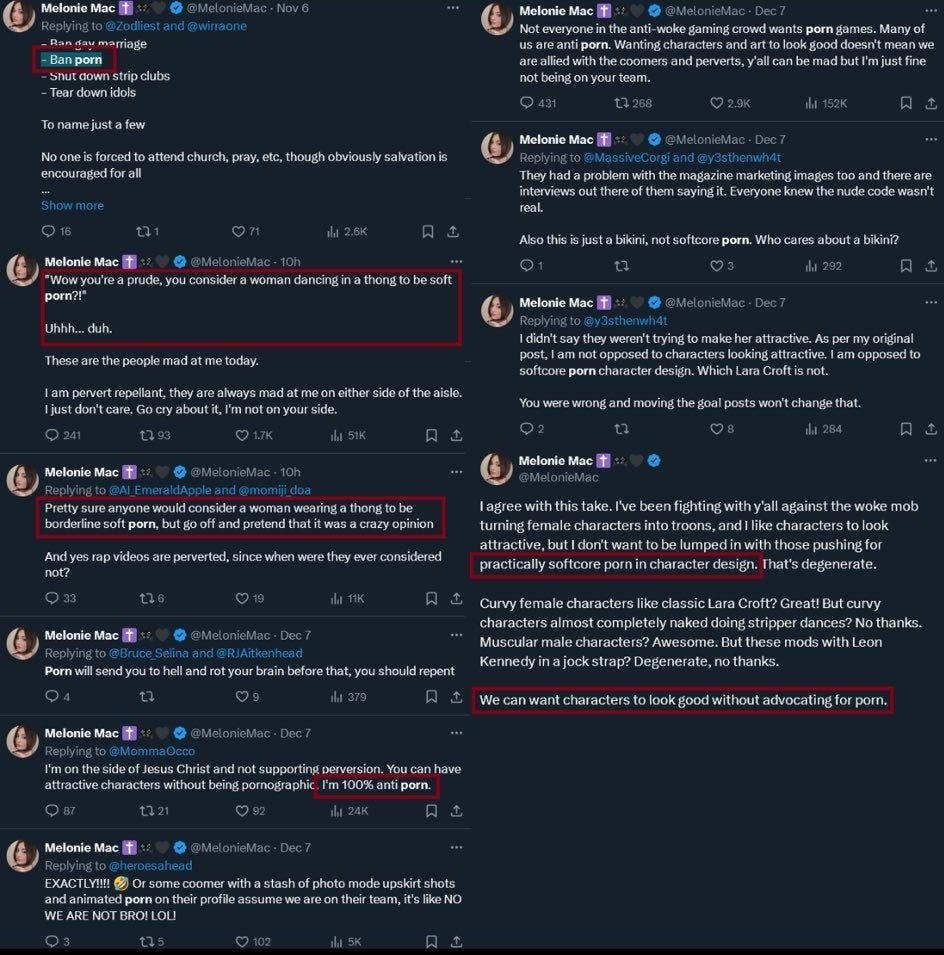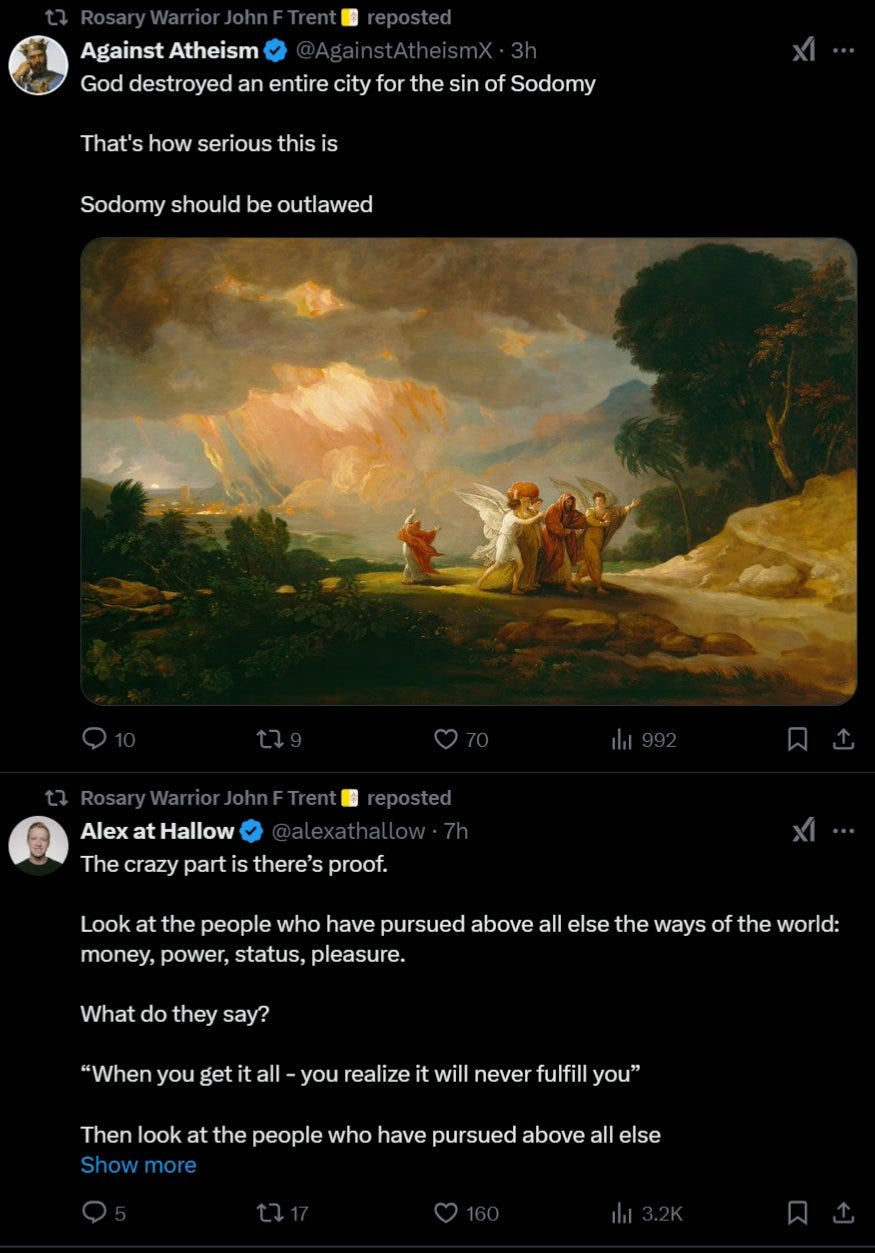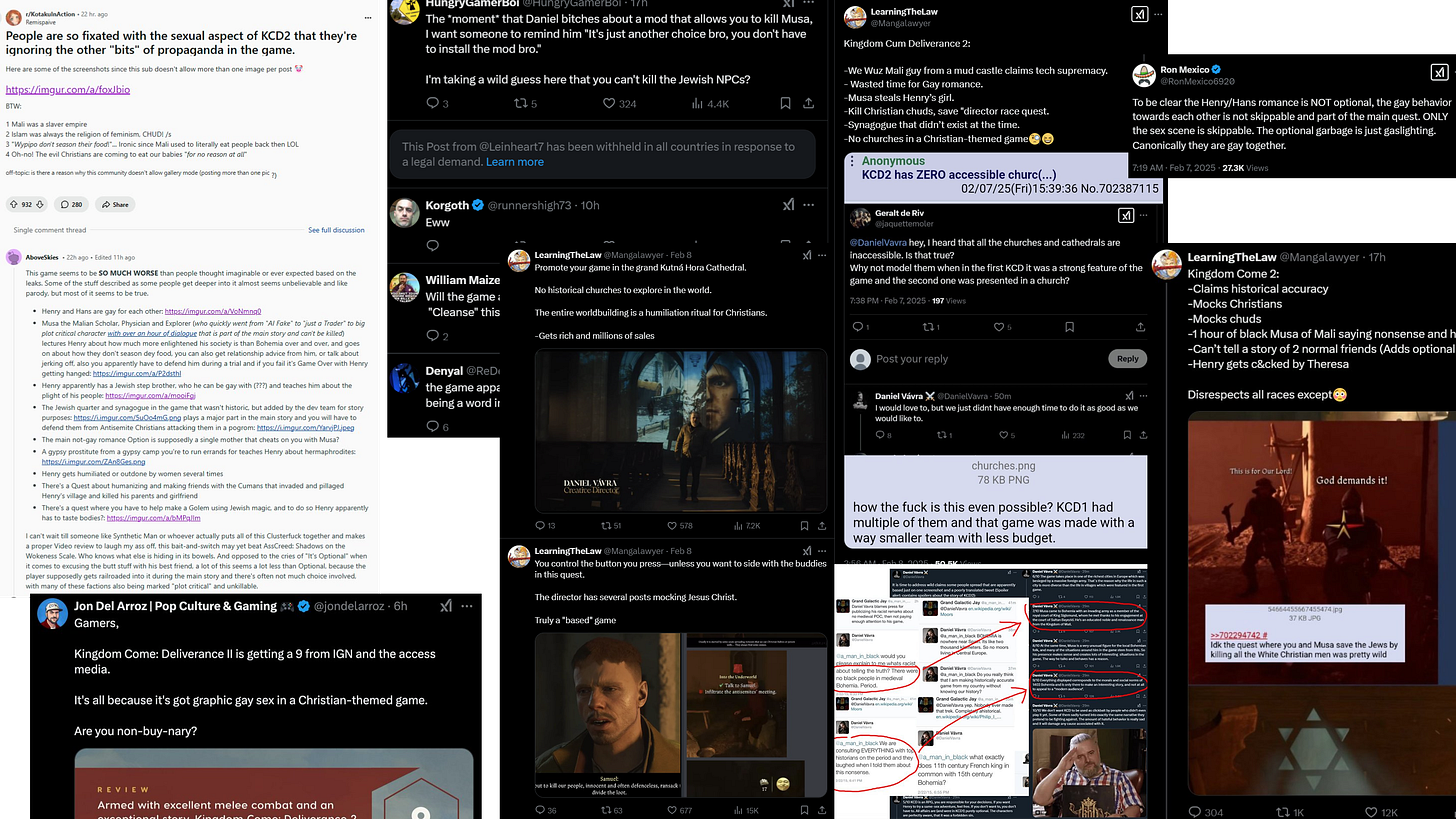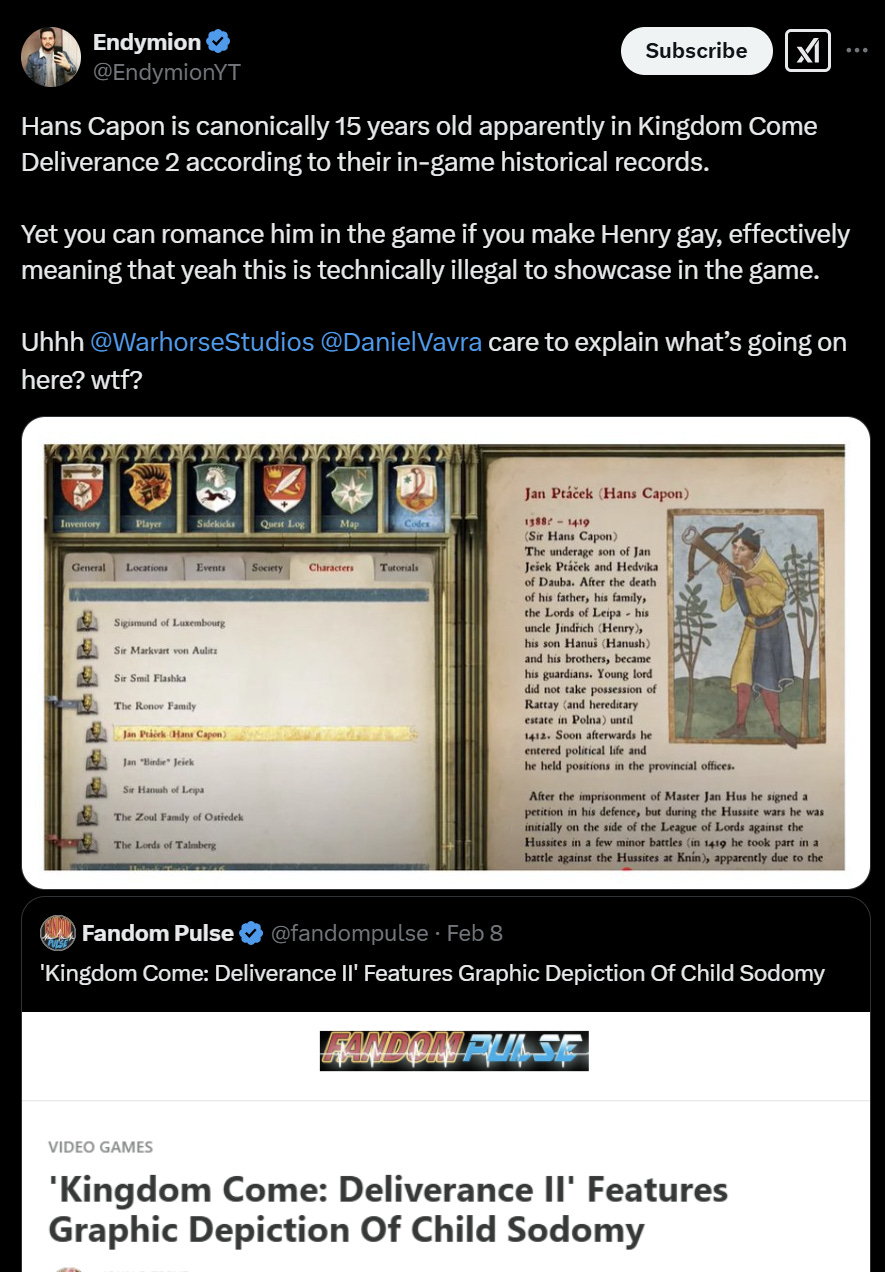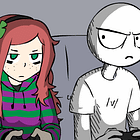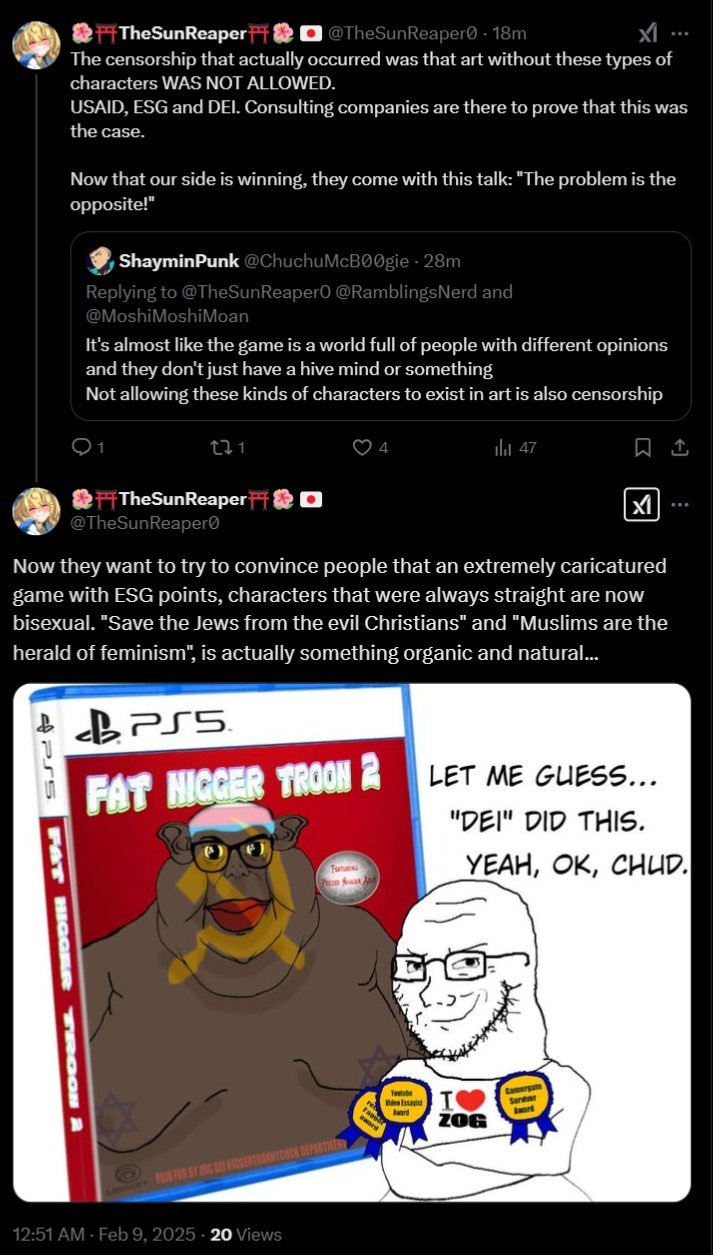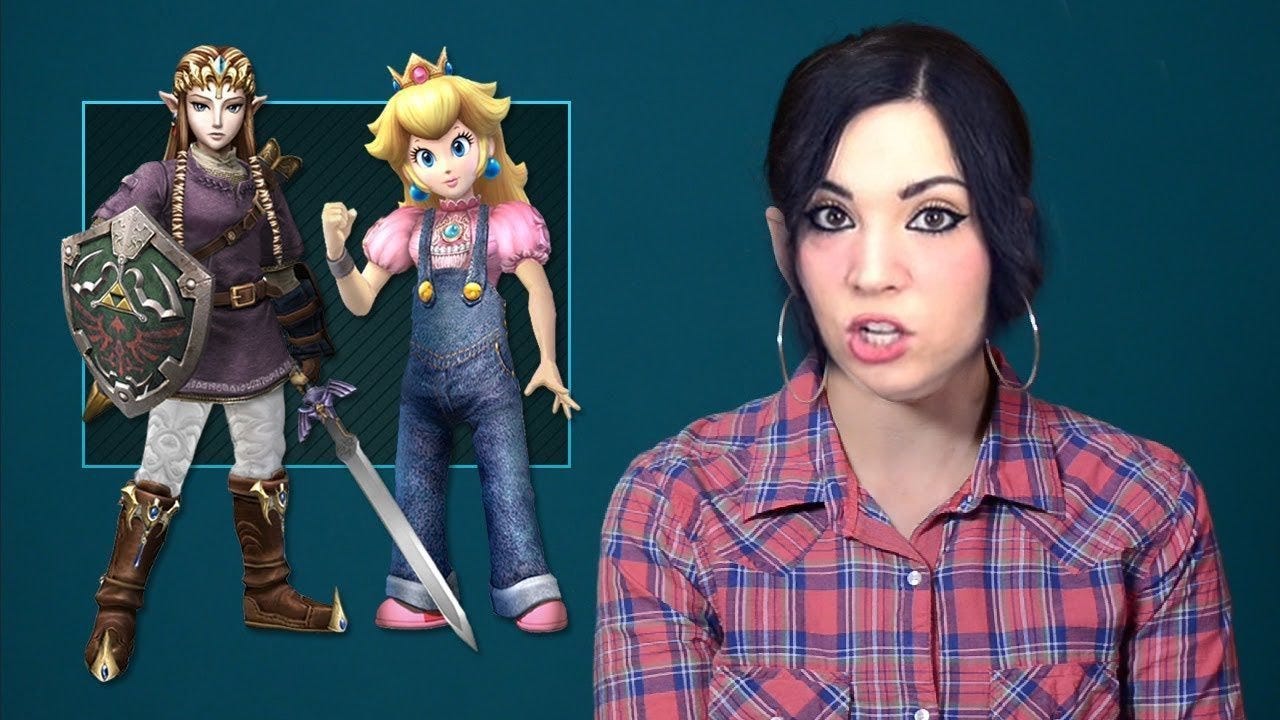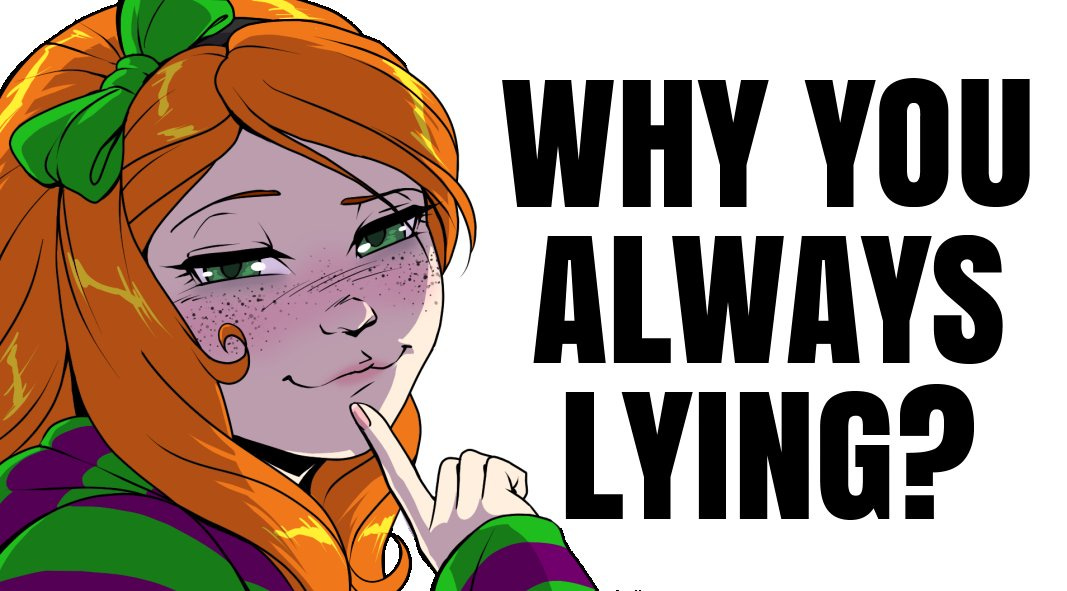Snatching Defeat from Victory: The True Culture Wars and the Legacy of Gamergate
In apparent triumph, disconcerting, puritanical trends among those claiming the mantle threaten to snatch defeat from the jaws of victory, even turning on those they claim to be defending.
It’s been about a year since Gamergate 2.0 and over a decade since the original first broke out in gaming circles. What started as an outcry against unethical media practices and corrupt activists in the industry, and later on a protest against censorship in the hands of similarly disingenuous consultants, continues to leave echoes in the public zeitgeist, and if anything seems to have been vindicated. By the time Side Scrollers podcast host Craig Skistimas delivered a scathing message to “legacy” video game journalists on December 17, 2024 that their time in the sun had passed and that streamers and commentators were now among the dominant voices in gaming, he was describing what had become self-evident. With the revelations that many of the mainstream outlets and ideologues who pushed those smear campaigns were among the beneficiaries of misused American taxpayers’ money following the USAID revelations, it’s little wonder why many on the anti-woke side celebrated. Yet in apparent triumph, disconcerting, puritanical trends among those claiming the mantle threaten to snatch defeat from the jaws of victory, even if that means turning on those they claim to be defending.
Over the course of the past couple of months, trends that had been brewing in the background had not only continued to metastasize but also converged into the controversy around a single Czech game, with which the true colors of more than a few influencers were laid bare. In so doing, it betrays how certain individuals have more in common with their erstwhile enemies than those they claim to be defending, and in the process, increasingly drop the facade and throw them to the wolves. While it’s tempting to ignore the issue, brush bad actors off as a non-issue, and otherwise hope it would pass, when it comes to prigs none of that would suffice.
Beyond Goonergate
What Youtuber SmashJT quipped half in jest in December 2024 as “Goonergate” had not gone away since it was previously covered as part of wider feature on those trying to repress others for their own good. Rather than “Conservative Inc.” pundits like Matt Walsh or similar outside parties, however, this puritanical impulse — more often than not, invoking God and traditional values as being the default — was coming from those who either were very adjacent to or had already ingratiated themselves among the anti-woke crowd, and not simply from the usual suspects either.
It began on January 13, when games journalist Paul Tassi dismissively belittled The First Descendant (an online multiplayer shooter by South Korean studio Nexon) on Twitter/X, commenting on how it had apparently lost 95.5% of its player base on Steam since its launch, which was misleading at best. When both Youtubers Dreadroberts and Melonie Mac jumped on the bandwagon the following day — whether to gloat about how gamers didn’t like attractive women for the former, or use the claim as proof that “queer ideology” and lewdness had no place for the latter — the puritanical grandstanding that had seemingly been simmering in the background went back into the limelight. Daniel “Razorfist” Harris, however, would help ramp up the intensity even further on January 15 by outright invoking Christian pretensions in decrying what he deemed degeneracy. The following day saw culture war-oriented site Fandom Pulse (founded by former Bounding into Comics EIC John F. Trent and firebrand author Jon del Arroz) signal-boosting that message to its vocal supporters, spiraling into a surge in outcries for works deemed “pornographic” to be stifled, or worse.
Compared to what happened previously, this intensification went further than online visibility. Despite Harris having decried the “Satanic Panic” and Religious Right moralists from the 1980s to 2000s, he had begun grandstanding about how it was all a “psyop” that never happened. Not only was such rhetoric reiterated by del Arroz, who similarly began playing up the growing pushback as akin to the persecution of Christians, but was followed up by his erstwhile boss calling those who consider so much as tolerating the existence of both transgender characters and developers as defending an evil that “should not be tolerated.” Meanwhile, other self-proclaimed traditionalists began gaslighting others on social media on their arguments as being simply “normal” Christian matters, with some, such as religious sci-fi/fantasy writer Isaac Young, helping shift the goalposts to the point that women in bikinis were too problematic. Even if that means setting their sights against creators (regardless if they’re nominally on the same side) as enemies to be stifled, as female artist and gaming commentator Madam Savvy found out to her dismay.
Whether those advocating such ideas genuinely believe in them, let alone are exemplars of their cause, is secondary at best. Del Arroz certainly showed little qualms about partaking in fanservice or engaging in dubious, if not unethical, behavior — among others, he went so far as to steal the likeness of a Spanish teacher for his female-coded byline with which to publish hypocritically erotic content — so long as no one else noticed. Razorfist’s near-chronic contrarianism on his part has made much of his commentary (both in and out of his online persona) seem more about his own duplicity than anything else, which combined with severe allegations of domestic abuse, have not helped his case. The (re)discovery of Melonie Mac’s past career as part of the very games journalist cliques she later professed to deride certainly did little to help her image, either, on top of her prior penchant for double standards. Yet unlike the likes of Walsh (who had previously outed themselves as opportunistic outsiders), it remains astounding how they had not simply managed to still make headway within anti-woke circles but were generally restrained enough to bide their time until circumstances seemed more favorable.
With the then-imminent inauguration of Donald Trump as US President, USAID revelations, and the perceived weaknesses stemming from woke and Left-leaning ideologues even before that point, perhaps it’s little wonder why more of these Goonergate scolds and their puritanical allies saw their time to shine. Yet it wouldn’t be long before they would join another kind of influencer in steering the culture wars to suit their own interests.
Smearing Kingdom Come Deliverance II
Among the more secular corners of the anti-woke camp, including those who came to dominate the discourse in Gamergate 2.0, one major title had captured their near-constant attention over the first month of 2025: Kingdom Come Deliverance II. Developed by Czech-based Warhorse Studios and finally released on February 4, 2025, this role-playing game based on 15th Century Bohemia has since gained near-unanimous accolades across the board. Yet amidst the praise, there’s a vocal strain of outrage, indignation, and even outright harassment over gross inaccuracies, if not betrayal of what its creators stood for. Rather than coming from legacy games journalism circles and progressive activists, as had been the case for the 2018 prequel, this was coming from those who previously professed to have sided with them, and not even material proof to the contrary would dissuade such notions. This, as it turned out, would have larger consequences.
Some, like Youtuber and vocal culture war commentator EndymionTV, had already tried muddying the waters as early as April 18, 2024, by accusing the developers of bending the knee to ESG/DEI policies due to their acquisition by Embracer Group, or forcing in “diversity” to Medieval Bohemia, despite the minorities in question including historic ones like Jews and Roma. On January 14, 2025, however, leaks began surfacing of black characters in the game (seemingly running contrary to how there weren’t any living in Bohemian lands at the time), as well as claims that Saudi Arabia banned the title over "unskippable” explicit scenes (including same-sex ones), which seemed to rekindled those earlier allegations of woke infiltration, and seemingly confirmed by through a purported investor. While lead creator Daniel Vavra confirmed that there would be homosexuality in the game a few days later (as an optional relationship path involving lead protagonist Henry), any rumors of censorship were ultimately unsubstantiated by those who could read Arabic, with the developer further adding that there would be no unskippable cutscenes or any compromises with his team’s creative vision. Rather than clear the air, however, the situation escalated.
To be sure, this was not helped by other concurrent events. The community manager hired for Warhorse Studios’ official Steam forums was found to have been banning critics using an excessively applied “Code of Conduct,” which only amplified social media backlash. Meanwhile, Vavra’s reputation for being unfiltered and confrontational online meant his responses towards increasingly bad faith comments similarly became as heated, even calling out Neonazi larpers for attempting to use his own part-Jewish lineage against him. This also to an extent, backfired, when he wound up inadvertently antagonizing commentator Rev says desu in the midst of such heated discourse, further adding fuel to the fire. Others like EndymionTV wasted little time passive-aggressively spinning the Czech creator’s behavior as an attack on gamers. Before long, others began digging up old tweets and articles discussing the original title’s historical accuracy — including old official Youtube comments from a community manager on how Henry was “canonically” straight — as proof of how the developers had betrayed the trust placed on fans, as though making it harder to take their word over those claiming to represent the community.
Towards the end of January, it had reached the point wherein some such as Mangalawyer/LearningTheLaw were spreading how the developers “confirmed” that the game’s not Christian (despite the first entry neither being promoted nor seen as such), which was soon spun by accounts like current Fandom Pulse contributor Yorch Torch Games into being an insult towards the faith, which played right into what his erstwhile colleagues del Arroz and Trent were claiming about “evil LGBTQ+ lifestyles.” As the first ratings began coming out from both legacy outlets like IGN and other gaming channels, it became vogue to not only dismiss these as red flags for propaganda, but also harass positive reviewers like WorthaBuy for being allegedly woke shills. The evidence for such claims was sketchy at best, with Vavra himself noting how the supposed investor proving woke infiltration had been trolling, while barring platitudes on DEI in Embracer’s website and reports (which don’t quite reflect on its business practices), no tangible proof exists of Warhorse Studios actually bending the knee. More than a few anti-woke figures were all too happy to repeat the same lines. Not even the game’s global launch on February 4, 2025, would abate that.
Betrayal, All at Once
The release of such a long-anticipated title, and one already mired in online controversy, should serve as the ultimate litmus test. That KCD2 garnered one million units sold within 24 hours of going live — given the roughly one billion korona ($41 million) budget, as revealed by Vavra in an interview with Czech site Seznam Zpravy, that would have been more than enough to recuperate those costs — might suggest it passed that challenge handily. Yet this did little to dissuade detractors among Goonergate puritans and anti-woke critics alike from lashing out over their grievances, almost all at once.
It didn’t take long for various aspects of the game to be scrutinized in the worst light possible, if not smeared beyond recognition. Whether it’s the character Musa of Mali, a traveling dignitary in the service of the antagonistic King Sigismund, being an unkillable loudspeaker for anti-European propaganda (a talking point that had been spread since the January leaks), or how a major questline involving Henry stopping a Jewish pogrom was historically inaccurate anti-Christian bias (complete with an enterable synagogue that didn’t exist at the time), there had been no shortage of “critiques.” When it was found that the one gay romance path involved companion and friend Hans Capon (based on the historical nobleman Jan Ptáček) — coincidentally, a guide to follow down that path was published by IGN almost immediately after launch — it wasn’t just seen as a betrayal of what was established in the first entry or proof of DEI subversion. By February 8, some, such as del Arroz and EndymionTV went so far as to use the in-game codex to conjure allegations of pedophilia Even the denizens of the KotakuInAction subreddit, once host to the original Gamergate, seemed more than happy to repeat the same nascent chorus.
It didn’t matter that the gay romance, as with other potential relationships, was entirely optional and required several hours of effort (with actual consequences), or that KCD2 in all its historical accuracy was never advertised as a one-to-one replication of medieval Bohemia. It meant nothing how Musa was presented as a reflection of the smug, hypocritical foreigner of the era who wasn’t meant to be likable, nor how the much-ballyhooed Jewish questline was not only grounded in Czech history but also more nuanced befitting the time period (both for and against the Jews). Neither the fact that the lead developer himself (in response to Harris) had to both clarify that there were no children in-game and that Hans was aged up, which was never a problem with the first entry and its DLC. As time went on, and more people were able to experience the title for themselves, it increasingly became clear that for regardless of stripe, the truth mattered less than wanting to be seen as telling the truth. Vavra lied and betrayed gamers, as far as they were concerned, with the rhetoric becoming akin to a warped article of faith. It was enough for some to pressure if not harass SmashJT into conforming to that narrative.
This went beyond just poisoning the well for some, who wanted such transgression punished. Whether it was Fandom Pulse releasing nigh-successive articles decrying “child sodomy” and “degeneracy” to justify a puritan version of cancel culture, or content creator JayViperTV outright trying to have his followers get Warhorse Studios’ hit reported and removed from Steam — an incident which, coincidentally, dragged in prominent Gamergate 2.0 firebrand Mark “Grummz” Kern, who had also been rehashing the same slanderous talking points over the prior weeks — the ironic parallels to what woke and Leftist activists tried to do regarding Hogwarts Legacy became hard to ignore. Certain indie developers riding off the anti-woke bandwagon, including Austria-based “dissident” studio Kvitgames (makers of The Great Rebellion), even went so far as to declare the game’s creators subversive enemies regardless of their success. While some in those circles disavowed such behavior, with the likes of Kern either washing their hands off altogether before moving onto another trending topic (though not without one more jab at Vavra’s expense) or falling back to more plausible critiques, there were those who kept doubling-down, rationalizing such antics in the name of stopping wokeness and DEI.
To be sure, those efforts failed. By February 17, KCD2 had surpassed two million in sales and reach a peak of over 250,000 concurrent players on Steam alone. All the same, the destructive yet hauntingly familiar trends that had been simmering over the past several months had nonetheless converged here for all to see. In a correspondence back in September 2024 with filmmaker Raymond Wallman for the Airplay retrospective, he expressed worries that the people who had been alienated by the woke and legacy media “are drifting toward a similar but opposite ideological rigidity,” with those touting how “everything is woke” instead of “everything is sexist” being rewarded. What’s happened, instead, showed this to be an understatement. However much some like Kern have tried downplaying if not dismissing those red flags as infighting instigated by the Left, invoking calls of unity, those grandstanding about defending gamers and developers have proven all too happy to use many of the same tactics (right down to harassment and gaslighting) for their own gain. What, then, is Gamergate, if this was what all those successes amounted to?
Prigs by Nature
Despite these developments, there’s been little effort from those aligned with the woke side of the culture wars to win over the very ones they previously scorned. There was certainly no “progressive” rallying around Vavra prior to KCD2’s launch, with many either writing him off as being “rightfully” punished for aligning with the original Gamergate, or using it as an excuse to smear those on the Right in general as reactionary bigots. Meanwhile, Eurogamer’s low review for the game (the only major site that did so according to Opencritic) similarly betrayed the author’s disdain for its creator, while IGN reviewer Leana Hafer’s online grandstanding seemed more concerned with attacking the anti-woke than being accurate about the game being supposedly defended. With more popular commentators like LegacyKillaHD noting how many riding off victory appear oblivious to those hijacking that momentum for their own agenda, and trolls on platforms such as Kiwi Farms exploiting the situation for further harassment, there’s an impression that gamers are once more left at the mercy of a censorious, repressive ouroboros. Ignoring the problem will only exacerbate it, yet are the only choices apathy or extremes? Perhaps not.
In a January 2025 blogpost by Y Combinator and Hacker News co-founder Paul Graham, he revived an archaic word from the 18th Century (“Prig”) to describe a more universal trend that has been around for generations. In every society, at various points in time, there have always been those he described as “attracted to a shallow, exacting kind of moral purity, and who demonstrates his purity by attacking anyone who breaks the rules” (at once convoluted and vague enough to be malleable). Be it “Christian virtue” among Victorian moralists and their puritanical successors, “Marxist-Leninist orthodoxy” among old guard communists and tankies, or “social justice” among progressives and the DEI/ESG-inclined, the performative self-righteousness among such prigs is a disconcerting constant. More than just presenting warped orthodoxies as virtuous, however, the way they exploit human nature to achieve those ends — from tapping into people’s fear of impropriety, to abusing the penchant towards outrage and eventually cancel culture — can give the impression that getting rid priggishness is doomed only to replicate the same vicious cycle. By that same token, however, such precedent and universality reveal how it can be mitigated.
The deceptively basic observation that “prigs are prigs by nature” is in itself insightful, as is the notion that “the burden of proof is on them.” Just as they more often desire power to enforce their superiority, they also feel compelled to obey (and project) repressive yet malleable rules, regardless of how genuine they may be in practice. It’s here, almost without fail, that such wannabe arbiters give themselves away, for that also involves defining new heresies to punish people for. Whether it’s branding certain games as degenerate or DEI propaganda with ever-flimsier explanations, there’s certainly been no shortage of either in action, nor a lack of those lapping them up without question. At the same time, the conscious bias being encouraged by Graham against accepting such attempts at face value has arguably taken root in many gaming circles. Just as the memories of yesteryear’s moral guardians and social justice warriors remain sharp in at least certain corners of the zeitgeist, there’s a persistent refusal among gamers and developers in general to allow themselves to be made pawns of by the current lot of competing influencers and ideologues, no matter how much the agenda-pushing is buried in lies or misdirection.
This hasn’t been lost on others observing the discourse. Youtuber and long-time Gamergate supporter SidAlpha decried certain popular anti-woke figures (including EndymionTV and Kern) for holding “zero journalistic value” and failing to put facts first. In response to the KCD2 affair, a commentary streamer going by Hypnotic not only criticized how much the conversation had devolved, but later on called out Goonergate puritans for “drowning out” whatever legitimate criticism were present against Vavra in favor of their ideological agitprop. Kabrutus of Gamergate 2.0 infamy not only practiced restraint when it came to the already-heated controversy, but refused to add Warhorse Studios’ work into his DEI Detected database, “just because of what a due Discord moderator or even a developer said or did.” Spanish gaming streamer Nuhre, meanwhile, rebuked the very framing of the culture wars altogether and rejected the extremes being posited by those claiming to represent her on either side. As disappointing as present trends may be, with some setting their sights on centrists as the enemy, there’s a certain reassurance in seeing not only vocal pushback but a growing drive against history repeating itself.
Perhaps more of the same might continue, with prigs on every side seeking to wield the proverbial whip while everyone else is kept blinded by hyperpartisan outrage. Maybe they’ll try to slip out of the limelight and go back to parroting more agreeable talking points, motte-and-bailey style, in the hopes that people would forget. After facing the same song and dance once too many, it’s fair to say, “not this time.” If people want better games, ethical standards and better protections for free expression, then then they must put those claiming to speak for them to task no matter what, or otherwise do it themselves. Enough is enough, and that reckoning is long overdue.

